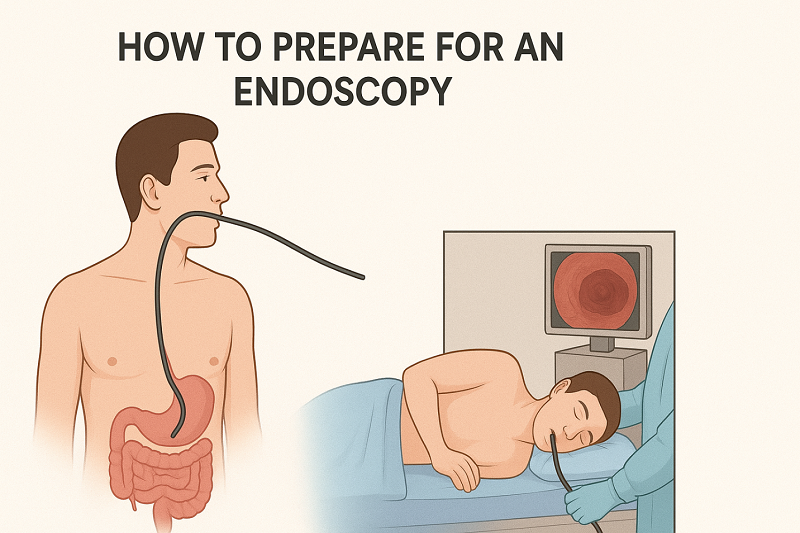How to prepare For an Endoscopy

The word "endoscopy" can sound intimidating, but it’s a very common and safe procedure that provides doctors with crucial insights into your digestive health. Often, the anticipation is the hardest part. Knowing exactly what to expect is the best way to feel calm, confident, and prepared.
We’ve created this step-by-step guide to walk you through everything—from what an endoscopy is to how you’ll feel afterwards. Let’s demystify the process together.
What Exactly Is an Endoscopy?

An endoscopy (often referred to as an OGD or upper endoscopy) is a procedure that allows a doctor to examine the lining of your upper digestive system. This includes your esophagus, stomach, and the beginning of your small intestine.
A thin, flexible tube called an endoscope is used. It has a tiny light and camera at its tip, which sends images to a monitor. This lets your doctor see any inflammation, bleeding, ulcers, or other issues clearly. It’s a vital tool for diagnosing conditions, taking biopsies (small tissue samples), and even performing treatments.
How to Prepare for an Endoscopy: A Step-by-Step Checklist
Proper preparation is the most important thing you can do to ensure your procedure goes smoothly and safely. Follow these instructions carefully.
-
The Golden Rule: Fasting (Nothing by Mouth)
This is non-negotiable. An empty stomach is crucial for two reasons:
- Safety: It prevents you from vomiting and accidentally inhaling food or liquid into your lungs while under sedation.
- Clarity: It gives your doctor a clear, unobstructed view.
Staying hydrated is important, but you must stick to clear liquids.
- You can have: Water, clear broth, black tea or coffee (no milk or cream), apple juice, and sports drinks.
- You must avoid: Any liquids that are red or purple (as they can be mistaken for blood during the procedure), milk, cream, almond milk, oatmeal, and juice with pulp.
- You can usually sip these clear fluids up until 2-4 hours before your procedure. Again, your doctor or nursing team will provide the exact cut-off time.
This is a critical step. You must inform your doctor about every medication you are taking, including:
- Prescription drugs
- Over-the-counter medicines (like aspirin or ibuprofen)
- Vitamins, supplements, and herbal remedies
Pay special attention to blood thinners (like Warfarin, Clopidogrel, Eliquis) and diabetes medications (especially insulin). Your doctor will give you very specific instructions on whether to take them, adjust the dose, or hold them before your procedure. Do not make this decision on your own.
This is a firm rule. You will be given sedation to make you comfortable, and it will impair your reflexes, judgment, and memory for up to 24 hours.
You must arrange for a responsible adult to:
- Drive you home from the facility.
- Stay with you for a few hours after you get home.
- You cannot drive, operate machinery, make important decisions, or drink alcohol for the rest of the day.
- For your safety, if you do not have a ride arranged, your procedure will likely be rescheduled.
What to Expect on Procedure Day
- Arrival: You’ll check in at the hospital or endoscopy center. The team will verify your information and have you sign a consent form.
- Getting Ready: You’ll change into a gown. A nurse will place an IV line in your arm to administer the sedative medication.
- The Procedure: You’ll lie on your side on a procedure table. The medical team will monitor your vital signs throughout. The sedation will make you feel drowsy and relaxed. Many patients fall asleep and remember very little, if anything, of the procedure itself, which typically takes only 15 to 30 minutes.
- The Recovery Room: After the procedure, you’ll be moved to a recovery area where you can rest comfortably. The sedation takes time to wear off completely. You might feel a bit groggy, bloated, or have a mild sore throat (from the endoscope), all of which are normal and temporary.
After the Procedure: Heading Home and Recovery
- Results: Your doctor will often discuss the initial findings with you and your ride once you are awake enough to understand. However, biopsy results take a few days to come back.
- At Home: Take it easy for the rest of the day. You can resume your normal diet once you feel able, starting with a light meal.
- The sedation effects can linger. Even if you feel alert, your coordination and reasoning may still be impaired. This is why having someone with you is so important.
We’re Here For You at Halcyon Hospital
Preparing correctly is the best way to ensure your endoscopy is a smooth and valuable step toward better health. If you have any questions at all—whether it’s about timing, medications, or anything else—please don’t hesitate to reach out. Our dedicated team at Halcyon Hospital is here to provide the clarity, support, and expert care you need, every step of the way.
Ready to take the next step? Halcyon Hospital is here for you.
- To book your appointment with one of our specialist consultants.
- To speak with a member of our nursing team for pre-procedure advice.
Contact us today—we’d be happy to help guide you on your journey to wellness.
Halcyon Objective
Quality and Safety is our foremost priority, and we aim to be a national leader in providing each patient with the safest, most compassionate, and highest quality of care. To support this, the facility has developed quality and safety policies, procedures, and best practices through organizational structures and processes, data systems and analytics, and other communication mechanisms.
Mission
To strive to keep up with the global trends in the healthcare industry and be at the forefront in delivering the latest innovative technology in relation to Gastro & Hepatobiliary in East and Central Africa.
We do things differently
Our approach is patient centered healthcare. Say goodbye to long lines & hard to get appointments with us today!
